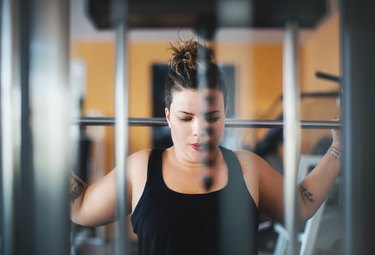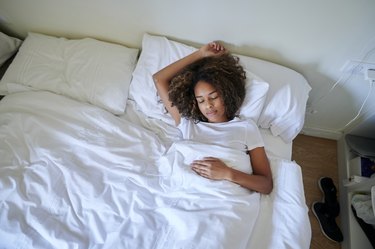
If you have type 1 or type 2 diabetes and keep track of your blood glucose levels, you know to expect higher levels after a meal. But you can have high blood sugar without eating, too.
"We typically think of high blood sugar levels resulting from the consumption of carbohydrate-rich foods and beverages, but blood sugar levels can be elevated for a number of reasons," says Anthea Levi, RD, CDN, registered dietitian and founder of Alive+Well Nutrition based in Brooklyn, New York.
Video of the Day
Video of the Day
Indeed, food is the biggest factor that influences blood sugar levels, says Kunal K. Shah, MD, board-certified internal medicine doctor and assistant professor in the Division of Endocrinology at Rutgers Robert Wood Johnson in New Brunswick, New Jersey.
But there's more to the story.
Certain activities, habits and medications can also cause a spike in glucose levels, and understanding these situations is especially important when you're trying to manage diabetes. Here's what to look out for:
1. Insufficient Sleep
Not getting enough sleep can make it difficult for your body to use insulin well, per the Centers for Disease Control and Prevention (CDC), which might result in a blood sugar spike the following day. (For the record, healthy adults should aim for seven to nine hours of shut-eye per night.)
"Sleep is extremely important to maintain appropriate blood sugar levels," says Dr. Shah. "It's very important to allow our muscles to rest after a day. And from a blood sugar perspective, it gives your pancreas a break."
Fix It
Although it's not always easy, do your best to get at least 7 hours of restorative sleep every night. You can set yourself up for success by following these strategies from the CDC:
- Go to bed at the same time every night and wake up at the same time each day, even on weekends
- Make your bedroom dark, quiet and cool (the best temperature for sleeping is around 65 degrees)
- Avoid screens (e.g. the TV, your smartphone) for an hour or two before bed
- Try not to eat a large meal or drink caffeine or alcohol too close to bedtime
- Get regular exercise during the day
2. Stress
When you're feeling stressed, your body goes into "fight-or-flight" mode, which causes your levels of the hormone cortisol to spike, Dr. Shah says.
Cortisol pushes your liver and muscles — the storehouses of sugar — to release sugar into your bloodstream.
This could be useful if you were stressed because, say, you were about to be attacked by a bear — your body would need that extra sugar to fight or run away.
But when the stress comes from something like traffic or a work deadline, the sugar stays in your bloodstream.
Fix It
Of course, it's not always possible to prevent stressful situations, but you can work to manage your response to stress in a healthy way to keep your blood sugar levels in check.
If you're feeling stressed, try calming down by writing down your feelings, listening to music, snuggling with your pet or taking a few slow, deep belly breaths.
To cope with stress in the long run, the CDC suggests the following:
- Eat a healthy, balanced diet
- Get regular exercise (aim for at least 150 minutes of activity each week)
- Make time for activities you enjoy
- Get enough sleep
- Share your feelings with others
- Avoid drugs and alcohol
3. Dehydration
When you have less water in your body, the sugar in your blood becomes more concentrated, per the CDC, leading to higher blood sugar levels.
Fix It
Stay hydrated by aiming to drink half your body weight in ounces of water each day. So for example, if you weigh 200 pounds, aim for 100 ounces (or about 12 cups) of water. (Note that water is the best way to stay hydrated; avoid sugary beverages like sports drinks or soda, which can spike your blood sugar.)
You can also eat hydrating foods like fruits and veggies (think: cucumbers, tomatoes, peppers, zucchini, watermelon). Just keep appropriate portion sizes in mind.
Watching your hydration is especially important if you're exercising or if you live in a hot climate.
4. Time of Day
Blood sugar can spike in the morning for everyone, whether or not you have diabetes. This is known as the "dawn phenomenon," per the Mayo Clinic, and it's caused by a natural rise in cortisol levels.
"The highest peak is around 7 or 8 in the morning," Dr. Shah says. "It gives us the energy to get out of bed and start our day."
The dawn effect is a common reason why you might have high blood sugar if you haven't eaten in 12 hours (i.e. since dinner the night before).
Fix It
Ask your health care provider if there are any additional steps you should take to prevent a high morning blood sugar. For example, they might recommend avoiding carbohydrates at night, taking your medication at a different time, changing the dose or switching to an alternate medication.
5. Medicated Nasal Spray
Certain types of over-the-counter nasal sprays that contain steroid (corticosteroid) medications, such as budesonide nasal spray, can potentially trigger an increased blood sugar response, per the CDC.
"Because they're basically synthetic versions of cortisol, they can raise your blood sugar," Dr. Shah explains.
However, Dr. Shah notes that he has only seen this once or twice in patients, adding that someone would need to be using quite a lot of nasal spray in order to notice higher blood sugars as a result. "You're likely not going to see blood sugar spikes if you use them appropriately," he says.
Fix It
Check in with your health care provider if you have concerns about the nasal spray you're taking and your blood sugar levels.
In general, always follow the dosage directions on the label for any medication to prevent overusing it.
Warning
Prescription corticosteroid medications like Prednisone can raise blood sugar levels and increase insulin resistance, which can lead to type 2 diabetes, according to Diabetes UK. If you're taking a corticosteroid medication and are worried about this side effect, talk to your doctor about ways to manage your blood sugar and/or other treatment options.
6. Anabolic Exercise
Another reason why your blood sugar might be high when you haven't eaten is if you've just done a form of anabolic exercise, says Dr. Shah. This includes exercises such as weightlifting or other muscle-building workouts, which cause blood sugars to rise pretty significantly.
"That's a normal response," Dr. Shah says. "As your muscles get worked, they release sugar, so temporarily your sugars will go high."
Fix It
If you have a continuous glucose monitor, wait for your blood sugar to come down as you start winding down your workout, says Dr. Shah. Then you can finish your workout with some aerobic exercise, such as jogging or using an exercise bike. "Aerobic exercise can lower your blood sugars quite a bit," he says.
7. Sunburn
There have been some reports that sunburn can result in elevated blood sugars, per the CDC. Although more research is needed to understand why this can happen, experts believe it's caused by a stress response from damage to the skin.
"The thought is that, in order to mobilize healing, [the body] will induce a stress response which will increase blood sugars," says Dr. Shah.
Fix It
To avoid a blood sugar spike and protect yourself from skin cancer, use sunscreen liberally and often. Wear a broad-spectrum SPF of 30 or higher every day, according to the American Academy of Dermatology (AAD), and make sure to reapply it every two hours if you're in the sun, and more often if you're sweating or swimming.
You may also want to stay in the shade while the sun's rays are the strongest (10 a.m. to 4 p.m.) and wear sun-protective clothing, including a wide-brimmed hat.
If you do get burned, try home remedies for sunburn such as taking over-the-counter NSAIDs, applying aloe vera and taking a cool bath or shower, which can help with pain and inflammation.
What's a Healthy Fasting Blood Sugar?
Per the Mayo Clinic, one way diabetes is diagnosed is from a fasting blood sugar test, which means a blood sample is taken after you have fasted (i.e. haven't eaten anything for eight to 12 hours).
Here's how the results break down for blood sugar levels after fasting:
- Normal: Fasting glucose levels less than 100 mg/dL (5.6 mmol/L)
- Prediabetes: Fasting blood sugars between 100 mg/dL (5.6 mmol/L) and 125 mg/DL (5.6 to 6.9 mmol/L)
- Diabetes: Fasting blood sugars that are 126 mg/dL (7 mmol/L) or higher on two separate tests
In other words, if your blood sugar after fasting for 12 hours is 100 mg/dL or higher, you may want to talk to your doctor about ways to manage your blood sugar.
When to See a Doctor
See your health care provider if you have any concerns about your blood sugar levels, particularly if you're not meeting the ADA's targets for before meals (80 to 130 mg/dL) and one to two hours after meals (below 180 mg/dL), though your individual targets from your practitioner may differ.
You should also look out for any symptoms that might indicate you have high blood sugar, called hyperglycemia. Signs of hyperglycemia can include frequent urination, dry mouth, blurred vision and increased thirst.
- Mayo Clinic: "Diabetes"
- National Institute of Diabetes and Digestive and Kidney Diseases (NIDDK): "What Is Diabetes?"
- Centers for Disease Control and Prevention (CDC): "Manage Blood Sugar"
- Centers for Disease Control and Prevention (CDC): "Diabetes Tests"
- Centers for Disease Control and Prevention (CDC): "10 Surprising Things That Can Spike Your Blood Sugar"
- American Diabetes Association (ADA) Standards of Care in Diabetes: "Classification and Diagnosis of Diabetes: Standards of Care in Diabetes—2023"
- National Institute of Diabetes and Digestive and Kidney Diseases (NIDDK): "Continuous Glucose Monitoring"
- American Diabetes Association (ADA): "Continuous Glucose Monitors"
- Cleveland Clinic: "Continuous Glucose Monitoring"
- Centers for Disease Control and Prevention (CDC): "How Much Sleep Do I Need?"
- American Academy of Dermatology (AAD): "Sunscreen FAQs"
- Mayo Clinic: "Dawn Phenomenon"
- Centers for Disease Control and Prevention (CDC): "Monitoring Your Blood Sugar"
- Diabetes UK: "Corticosteroids and Diabetes"
Is this an emergency? If you are experiencing serious medical symptoms, please see the National Library of Medicine’s list of signs you need emergency medical attention or call 911.


